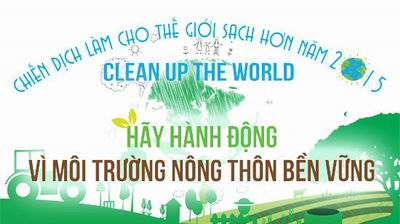Tuesday, 24/02/2026 | 22:56 GMT+7
On September 19, 2015, the Campaign for Clean up the World with the theme “Take action for sustainable rural environment” was favorably responded and implemented by the People’s Committee of Nam Dinh Province to stimulate activities to raise community’s awareness of environmental protection in rural areas.

To respond to the Campaign for "Clean up the World” 2015, the People’s Committee of Nam Dinh Province directed sectors to base themselves on real conditions to hold community activities such as organizing meetings or practical activities suitable to each area of the province; hanging banners, show-boards, posters, slogans of the environment theme on streets, in public areas, offices, crowded areas and areas of parade and propaganda of environmental protection.
Furthermore, since the beginning of 2015, Nam Dinh Department of Agriculture and Rural Development has also implemented a project of low-carbon agriculture support funded by Asian Development Bank in the whole province with a goal of decreasing environmental pollution in breeding through the expansion and advancement in the programme of biological gas regenerating clean energy; improvement of livelihood and enhancement of life quality of people living in rural areas. This method allows breeding waste management to absolutely make use of gas sources so as to serve daily activities such as cooking, lighting, heating breeding facilities, etc.
Cleaner production programmes aiming to reduce environmental pollution in industrial production, handicraft and small-scale industry in trade villages in rural areas such as assistance in expenditure on building manholes for containing sewage, building smoke stacks in mechanical villages, etc. are stimulated by Nam Dinh Department of Industry and Trade, functional sectors and local authorities. To present, the situation of industrial pollution in rural areas has been controlled more strictly and improved gradually through the removal of production bases causing environmental pollution from residential areas to industrial clusters and industrial zones
Industrial clusters and industrial zone already coming into operation have been concerned and provided with focused wastewater treatment systems. The collection rate of industrial solid waste, hazardous waste generated from production bases, service facilities in industrial clusters and industrial zones reaches 100%.
Ngoc Anh








 Consultation on the methodology for developing and updating energy consumption standards for four major industrial sectors
Consultation on the methodology for developing and updating energy consumption standards for four major industrial sectors
 Opening of the 2025 Energy-Efficient Equipment and Green Transition Exhibition Fair
Opening of the 2025 Energy-Efficient Equipment and Green Transition Exhibition Fair
 Energy-saving solutions and green transition promotion
Energy-saving solutions and green transition promotion
 The 9th VEPG Steering Committee Meeting: Strengthening Coordination for Viet Nam’s Just Energy Transition
The 9th VEPG Steering Committee Meeting: Strengthening Coordination for Viet Nam’s Just Energy Transition